新概念第一册 117课笔记
新概念第一册 117课笔记
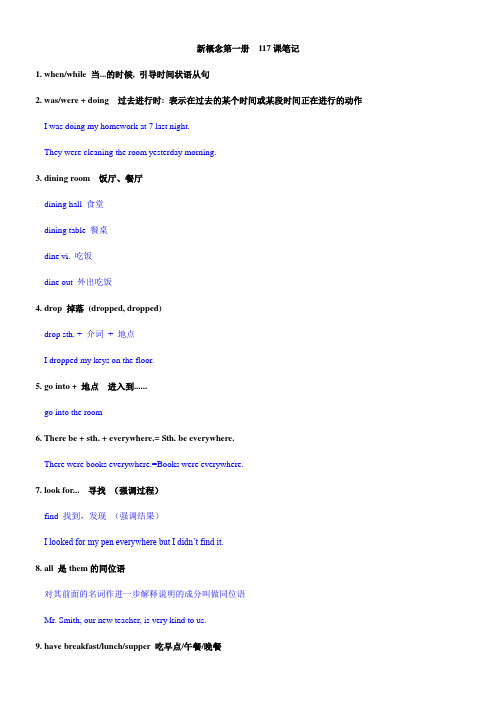
新概念第一册117课笔记1. when/while 当...的时候, 引导时间状语从句2. was/were + doing 过去进行时: 表示在过去的某个时间或某段时间正在进行的动作I was doing my homework at 7 last night.They were cleaning the room yesterday morning.3. dining room 饭厅、餐厅dining hall 食堂dining table 餐桌dine vi. 吃饭dine out 外出吃饭4. drop 掉落(dropped, dropped)drop sth. + 介词+ 地点I dropped my keys on the floor.5. go into + 地点进入到......go into the room6. There be + sth. + everywhere.= Sth. be everywhere.There were books everywhere.=Books were everywhere.7. look for... 寻找(强调过程)find 找到,发现(强调结果)I looked for my pen everywhere but I didn’t find it.8. all 是them的同位语对其前面的名词作进一步解释说明的成分叫做同位语Mr. Smith, our new teacher, is very kind to us.9. have breakfast/lunch/supper 吃早点/午餐/晚餐注意:三餐前不能有冠词the10. put sth. into... 把......放进......put the books into the bag11. both 两个都(1) 放在主语后边,作同位语,表示“两者都......”We both like English.(2) both of + 人称代词(宾格)Both of them 他们两个人=They both...注意:both用于两者,all 用于三者或以上,结构同both,他们的位置通常放be动词后实义动词前12. try to do sth. 试图做某事;努力做某事try doing sth. 尝试做某事13. 过去完成时:had + done过去完成时表示过去某一时间或动作以前已经发生或完成了的动作。
新概念英语第一册自学笔记含课后练习答案:Lesson 117-118

新概念英语第一册自学笔记含课后练习答案:Lesson117-118新概念英语第一册117-118课课文重难点详解 further notes onthe text1.look for,寻找(强调动作过程);find,找到(强调寻找的结果)。
2.tommy had already swallowed them! 汤米已经把硬币咽了下去!句中用了过去完成时形式 had swallowed。
过去完成时用来表示过去两个动作中发生在前的那个动作。
显然,句中咽下硬币的动作发生在夫妇俩能够把硬币从汤米手中抢过来之前。
3.later that morning,那天上午的晚些时候。
later是副词late的比较级。
4.any changechange是个多义词,既有“零钱”的意思,也有“变化”的意思。
此处既可指“硬币”;也可指“情况的变化”。
这是双关(pun /p)n/)修辞法。
新概念英语第一册117-118课语法知识点 grammar in use过去实行时构成: be的过去式+现在分词。
过去实行时表示过去某时正在实行的情况或动作。
过去实行时和一般过去时经常在同一个句子里使用。
过去实行时表示过去正在实行的情况或动作,一般过去时则表示比较短暂的动作或事件。
过去实行时的时间状语从句一般由when,while及(just)as等来引导,说明主句中动作发生时的背景。
此外,可用 while或 at the time等强调同时实行的两种或几种动作。
请看例句:when i was doing the housework, my husband telephoned mefrom the office.当我正在干家务时,我丈夫从办公室打电话给我。
while i was listening to the stereo, my mother came into the room.我正在听立体声节目时,我母亲进房间了。
just as she was cleaning her shoes, george knocked at the door.她正在擦鞋时,乔治敲门了。
新概念英语第一册笔记新版:第40讲(117-118)

Lesson 117 Tommy's breakfast[课⽂]When my husband was going into the dining room this morning,he dropped some coins on the floor.There were coins everywhere.We looked for them, but we could not find them all.While we were having breakfast, our little boy, Tommy, found two small coins on the floor.He put them both into his mouse.We both tried to get the coins, but it was too late.Tommy had already swallowed them!Later that morning, when I was doing the housework, my husband phoned me from the office."How's Tommy?" He asked."I don't know," I answered, "Tommy's been to the toilet three times this morning, but I haven't had any change yet!" Lesson 119 A true story[词汇]story n. 故事happen v. 发⽣thief n. 贼enter v. 进⼊dark adj. ⿊暗的torch n. ⼿电筒voice n. (说话的)声⾳parrot n. 鹦鹉in the darkIt's very dark.[story ⼀般性的故事,可以真实的也可以是虚构的]fable 寓⾔故事legend 传奇故事tale 神州故事I want to tell you a true story?Do you like stories?story book 故事书story teller 讲故事的⼈make up 化妆,编造a friend of mineone of my friends[happen 偶然的发⽣]take place [发⽣,经过安排的]It happens to sb.It happened to sb.It happened to a friend of mine last year.Don't be angry, it happens every day.Do you like stories?I want to tell you a true story.It happened to one of my friends last year.The wedding took place yesterday.It happens to somebody.It happened to somebody.in the dark ⿊暗中,秘密的torch song 忧郁的情歌[voice 嗓⾳]sound 声⾳noise 噪⾳the sound of music ⾳乐之声throat 嗓⼦Sb. has a good voice.I had a good voice.[提⽰]When did the story happen?Who did the story happen to?Who is George?When the story happened, what was George doing?Do you like stories?I want to tell you a true story.It happened to a friend of mine a year ago.While my friend, George, was reading in bed, tow thieves climbed into his kitchen. After they had entered the house, they went into the dining room.It was very dark, so they turned on a torch.Suddenly, they heard a voice behind them."What's up? What's up?" Someone called.Two thieves went into the dining room after they had entered the house. It was very dark. The thieves turned on the torch.Suddenly, they heard a voice behind them."What's up? What's up?" someone called.The thieves dropped the torch and ran away as quickly as they could.George heard the noise and came downstairs quickly.He turned on the light, but he couldn't see anyone.George saw the parrot.What did the parrot say?"What's up, George?" he called.How did George answer?"Nothing, Henry," George said and smiled. "Go back to sleep."George heard the noise and came downstairs quickly.He turned on the light, but he couldn't see anyone.But George's parrot, Henry, was still there."What's up, George?" he called."Nothing, Henry," George said and smiled. "Go back to sleep."[课⽂]Do you like stories? I want to tell you a true story.It happened to a friend of mine a year ago.While my friend, George, was reading in bed, two thieves climbed into his kitchen. After they had entered the house, they went into the dining room.It was very dark, so they turned on a torch.Suddenly, they heard a voice behind them."What's up? What's up?" someone called.The thieves dropped the torch and ran away as quickly as they could.George heard the noise and came downstairs quickly.He turned on the light, but he couldn't see anyone.The thieves had already gone.But George's parrot, Henry, was still there."What's up, George?" He called."Nothing, Henry," George said and smiled. "Go back to sleep."I will help you as possible as I can.I will love you as much as I can.Lesson 121 The man in a hat[词汇]customer n. 顾客forget v. 忘记manager n. 经理serve v. 照应,服务,接待counter n. 柜台recognize v. 认出forget -> forgot -> forgottenon the counterThis is something (that) I must decide about.This is something about which I must decide.forget to do sth. 忘记去做某事forget doing sth. 忘记做了某事I have forgotten to bring my book.I will never forget finding that rare coin in my garden.take sth. with sb.I bought a book yesterday.But I forgot to take it with me.expensive 昂贵的dictionary 字典half an hour agoI bought two expensive dictionaries here half an hour ago. But I forgot to take them with me.Who served you?The lady served me.The lady is standing behind the counter.The lady (who is) standing behind the counter served me.Which books did you buy?I bought the books.The books are on the counter.I bought the books which are on the counter.gentleman 绅⼠Did you serve this gentleman half an hour ago?He is the man.The man bought these books.He is the man who bought these books.He says he is the man who bought these books.I can't remember.I served the man.The man who I served was wearing a hat.This is the man.You served the man.This is the man who you served.Is this the man who you served?[课⽂]I bought two expensive dictionaries here half an hour ago, but I forgot to take them with me.Who served you, sir?The lady who is standing behind the counter.Which books did you buy?The books which are on the counter.Did you serve this gentleman half an hour ago, Caroline?He says he's the man who bought these books.I can't remember.The man who I served was wearing a hat.Have you got a hat, sir?Yes, I have.Would you put it on, please?All right.Is this the man that you served, Caroline?Yes. I recognize him now.定语从句:beautiful flowera book on the deskI saw the boy yesterday.This is the boy.This is the boy I saw yesterday.I have a sister.She lives in Paris.I have a sister who lives in Paris.关系代词的功能:1 连接主句和从句2 在从句中做句⼦成分。
裕兴新概念第一册学习笔记(117-120)
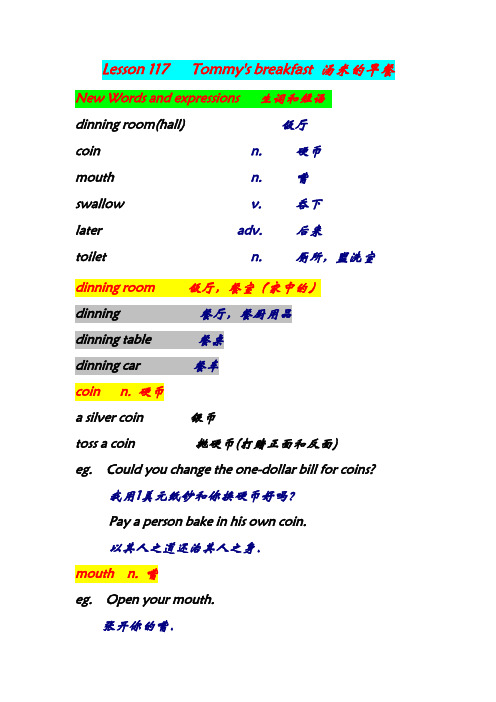
Lesson 117 Tommy's breakfast 汤米的早餐New Words and expressions 生词和短语dinning room(hall) 饭厅coin n. 硬币mouth n. 嘴swallow v. 吞下later adv. 后来toilet n. 厕所,盥洗室dinning room 饭厅,餐室(家中的)dinning 餐厅,餐厨用品dinning table 餐桌dinning car 餐车coin n. 硬币a silver coin 银币toss a coin 抛硬币(打赌正面和反面)eg. Could you change the one-dollar bill for coins?我用1美元纸钞和你换硬币好吗?Pay a person bake in his own coin.以其人之道还治其人之身.mouth n. 嘴eg. Open your mouth.张开你的嘴.-Don’t talk with your mouth full!-嘴里塞满食物时不要说话!Shut your mouth!(口语)闭嘴It sounds funny in your mouth.这种话由你的口中说出来,听起来就很可笑。
by word of mouth 口头上from hand to mouth 勉强糊口from mouth to mouth 口口相传have a big mouth 大嘴巴,嘴不严swallow1) v. 吞…, 咽…eg. He swallowed (up) the medicine with water.他把药和水一起吞下1) n. 一口(一口的量)take a swallow of beer 喝一口啤酒at one swallow 一饮而尽★swallow v. 吞下①v. 吞下,咽下Tommy had swallowed the coins.汤米已经吞下了那硬币.②v. 抑制,使不流露I tried hard to swallow my doubts.我强忍着不露出怀疑的神色。
新概念英语第一册Lesson117~122课文注释

新概念英语第一册Lesson117~122课文注释新概念英语第一册Lesson117~118课文注释1 在英文中表示过去某时正在进行的动作,要用过去进行时。
与现在进行时相比,过去进行时的区别就在于要用be 的过去式。
过去进行时的例子有:When my husband was going into the dining room this morning…;While we were having breakfast…等。
2 them all, all用来强调每一个硬币。
从语法上来讲,all是them的同位语。
紧跟在一个名词或代词后,进一步说明前面名词或代词是谁或什么东西的名词或代词,叫同位语。
3 our little boy, Tommy.Tommy是boy的同位语。
4 put them both…both是them的同位语。
5 we both...both是we的同位语。
6 Tommy had already swallowed them!句中用了过去完成时。
过去完成时用来表示两个动作中,发生在前的那个动作。
显然,句中“咽下硬币”的动作发生在夫妇俩能够把硬币从汤米手中抢过来之前。
7 later that morning 那天上午的晚些时候。
later是副词late的比较级。
8 any changechange是个多义词,既有“零钱”的意思,也有“变化”的意思。
此处既可指“硬币”,亦可指“情况的变化”。
这是“双关”修辞法。
新概念英语第一册Lesson119~120课文注释1 as quickly as they could是状语,修饰ran away。
第1个as是副词,第2个as是连词.引导比较状语从句。
could后省略了run,是“能跑多快就跑多快”的意思。
2 What’s up?干什么?有什么事?3 he calledhe指parrot。
英语中,动物有时用he或she代替,是“拟人”的写法。
(完整word版)新概念英语117课讲义
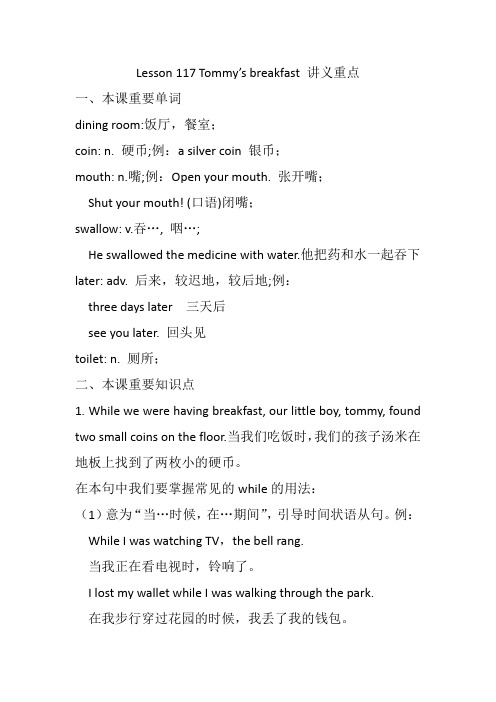
Lesson 117 Tommy’s breakfast 讲义重点一、本课重要单词dining room:饭厅,餐室;coin: n. 硬币;例:a silver coin 银币;mouth: n.嘴;例:Open your mouth. 张开嘴;Shut your mouth! (口语)闭嘴;swallow: v.吞…, 咽…;He swallowed the medicine with water.他把药和水一起吞下later: adv. 后来,较迟地,较后地;例:three days later 三天后see you later. 回头见toilet: n. 厕所;二、本课重要知识点1. While we were having breakfast, our little boy, tommy, found two small coins on the floor.当我们吃饭时,我们的孩子汤米在地板上找到了两枚小的硬币。
在本句中我们要掌握常见的while的用法:(1)意为“当…时候,在…期间”,引导时间状语从句。
例:While I was watching TV,the bell rang.当我正在看电视时,铃响了。
I lost my wallet while I was walking through the park.在我步行穿过花园的时候,我丢了我的钱包。
(2)意为“虽然,尽管”,引导让步状语从句。
例:While it was late,he went on working.虽然很晚了,但他还在继续工作。
While he is in poor health,he works hard.虽然他身体不好,但他还是努力工作。
2. We both tried to get the coins, but it was too late.我们都试图把两枚硬币拿出来,但太迟了。
在本句中我们要掌握all与both的用法及区别:“全部”。
新概念英语第一册Lesson117-118笔记(语法点+配套练习+答案)

put ... into ...
把...放到
have/has been to
曾去过某地
四、语法解析
1.现在进行时:说话此刻正在发生
结构:be (am/is/are) + v.ing
时间标志词:Look! Listen! now, at the moment
练习:
1.One of themis taking(take) photos for us now.
11.Didyoufinish(finish) your homework yesterday?
12.Her motherdidn’t give(not give) the girl any present.
13.When hewent(go) back to England, hewass(be) very tired.
The childrenwereallhappy.
Bothof the twins wanted to go to the theatre.
Allof my classmates are invited to my party.
three times三次
现在完成时的标志词
twice两次
once一次
have/has been to去过某地,已回
have/has gone to去了某地,未回
My father isn't at home, hehas gone toBeijing.
Mr Wang isn't here.Hehas gone toQingdao.
My fatherhas been toBeijing twice.
Ihaveneverbeen tothe Great Wall.
新概念英语第一册第117课Lesson117课文单词知识点

Lesson117When my husband was going into the dining room this morning, he dropped some coins on the floor.There were coins everywhere. We looked for them, but we could not find them all.While we were having breakfast, our little boy, Tommy, found two small coins on the floor.He put them both into his mouth. We both tried to get the coins, but it was too late. Tommy had already swallowed them!Late that morning, when I was doing the housework, my husband phoned me from the office.'How's Tommy?' he asked. 'I don't know,' I answered, 'Tommy's been to the toilet three times this morning, but I haven't had any change yet!' 今天早晨我丈夫走进饭厅时,把一些硬币掉在地上了。
到处都是硬币。
我们虽然找了,但没有把它们全部找到。
正当我们吃早饭时,我们的小男孩汤米在地上找到两枚小硬币。
他把这两枚硬币全都放进嘴里。
我们俩都试图把这两枚硬币拿出来,但太迟了。
汤米已经把硬币咽了下去!那天下午的晚些时候,当我正做家务时,我丈夫从办公室打来电话。
新概念英语第一册课文翻译及学习笔记Lesson117知识分享

新概念英语第一册课文翻译及学习笔记Lesson117【课文】When my husband was going into the dining room this morning, he dropped some coins on the floor.There were coins everywhere. We looked for them, but we could not find them all.While we were having breakfast, our little boy, Tommy, found two small coins on the floor.He put them both into his mouth. We both tried to get the coins, but it was too late. Tommy had already swallowed them!Late that morning, when I was doing the housework, my husband phoned me from the office.'How's Tommy?' he asked. 'I don't know,' I answered,'Tommy's been to the toilet three times this morning, but I haven't had any change yet!'【课文翻译】今天早晨我丈夫走进饭厅时,把一些硬币掉在地上了。
到处都是硬币。
我们虽然找了,但没有把它们全部找到。
正当我们吃早饭时,我们的小男孩汤米在地上找到两枚小硬币。
他把这两枚硬币全都放进嘴里。
我们俩都试图把这两枚硬币拿出来,但太迟了。
汤米已经把硬币咽了下去!那天下午的晚些时候,当我正做家务时,我丈夫从办公室打来电话。
新概念一117,118知识点整理
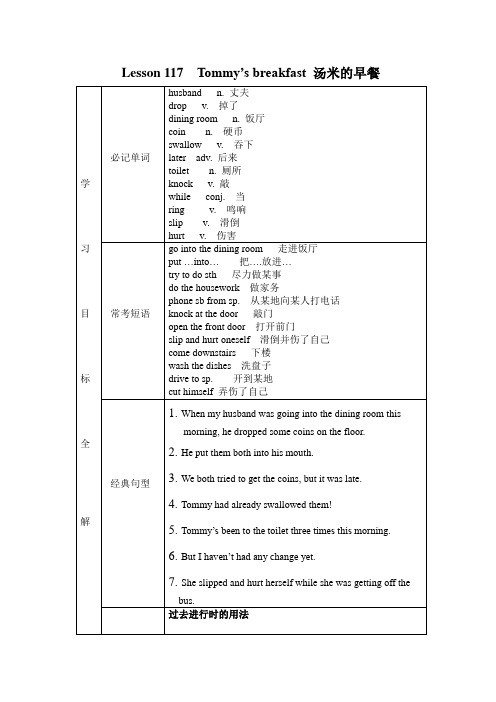
Lesson 117 Tommy’s breakfast 汤米的早餐学习目标全解必记单词husband n. 丈夫drop v. 掉了dining room n. 饭厅coin n. 硬币swallow v. 吞下later adv. 后来toilet n. 厕所knock v. 敲while conj. 当ring v. 鸣响slip v. 滑倒hurt v. 伤害常考短语go into the dining room 走进饭厅put …into…把….放进…try to do sth 尽力做某事do the housework 做家务phone sb from sp. 从某地向某人打电话knock at the door 敲门open the front door 打开前门slip and hurt oneself 滑倒并伤了自己come downstairs 下楼wash the dishes 洗盘子drive to sp. 开到某地cut himself 弄伤了自己经典句型1.When my husband was going into the dining room thismorning, he dropped some coins on the floor.2.He put them both into his mouth.3.We both tried to get the coins, but it was late.4.Tommy had already swallowed them!5.Tommy’s been to the toilet three times this morning.6.But I haven’t had any change yet.7.She slipped and hurt herself while she was getting off thebus.过去进行时的用法重点语法定义:表示过去某一时刻或者某个时间正在进行的动作。
新概念英语第一册Lesson117~122自学笔记精讲解析

新概念英语第一册Lesson117~122自学笔记精讲解析新概念英语第一册Lesson117~118自学笔记精讲解析1.look for,寻找(强调动作过程);find,找到(强调寻找的结果)。
2.Tommy had already swallowed them! 汤米已经把硬币咽了下去!句中用了过去完成时形式 had swallowed。
过去完成时用来表示过去两个动作中发生在前的那个动作。
显然,句中咽下硬币的动作发生在夫妇俩能够把硬币从汤米手中抢过来之前。
ter that morning,那天上午的晚些时候。
later是副词late的比较级。
4.any changechange是个多义词,既有“零钱”的意思,也有“变化”的意思。
此处既可指“硬币”;也可指“情况的变化”。
这是双关(pun /p)n/)修辞法。
新概念英语第一册117-118课语法知识点 Grammar in use过去实行时构成: be的过去式+现在分词。
过去实行时表示过去某时正在实行的情况或动作。
过去实行时和一般过去时经常在同一个句子里使用。
过去实行时表示过去正在实行的情况或动作,一般过去时则表示比较短暂的动作或事件。
过去实行时的时间状语从句一般由when,while及(just)as等来引导,说明主句中动作发生时的背景。
此外,可用 while或 at the time等强调同时实行的两种或几种动作。
请看例句:When I was doing the housework, my husband telephoned me from the office.当我正在干家务时,我丈夫从办公室打电话给我。
While I was listening to the stereo, my mother came into the room.我正在听立体声节目时,我母亲进房间了。
Just as she was cleaning her shoes, George knocked at the door.她正在擦鞋时,乔治敲门了。
新概念英语 1 lesson117知识点
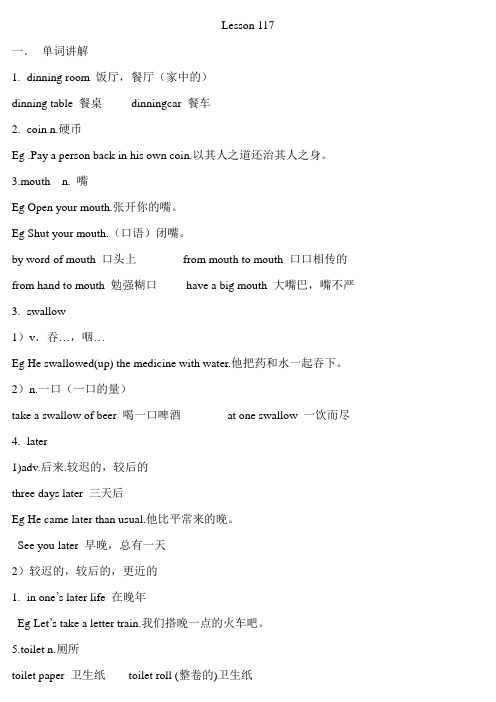
Lesson 117一.单词讲解1.dinning room 饭厅,餐厅(家中的)dinning table 餐桌dinning c ar 餐车2.coin n.硬币Eg .Pay a person back in his own coin.以其人之道还治其人之身。
3.mouth n. 嘴Eg Open your mouth.张开你的嘴。
Eg Shut your mouth.(口语)闭嘴。
by word of mouth 口头上from mouth to mouth 口口相传的from hand to mouth 勉强糊口have a big mouth 大嘴巴,嘴不严3.swallow1)v.吞…,咽…Eg He swallowed(up) the medicine with water.他把药和水一起吞下。
2)n.一口(一口的量)take a swallow of beer 喝一口啤酒at one swallow 一饮而尽ter1)adv.后来.较迟的,较后的three days later 三天后Eg He came later than usual.他比平常来的晚。
See you later 早晚,总有一天2)较迟的,较后的,更近的1.in one’s later life 在晚年Eg Let’s take a letter train.我们搭晚一点的火车吧。
5.toilet n.厕所toilet paper 卫生纸toilet roll (整卷的)卫生纸toilet soap 香皂toilet water 花露水,化妆水二.Grammar:过去进行时一)构成:肯定句:主语+was/ were +doing+其他否定句:主语+was/ were + not +doing+其他一般疑问句:Was/ were +主语+ doing+其他二)过去进行时的基本用法1)表示过去某一时间正进行或发生的动作。
新概念第一册课文翻译及知识点【Lesson115、117、119】

【导语】新概念英语作为⼀套世界闻名的英语教程,以其全新的教学理念,有趣的课⽂内容和全⾯的技能训练,深受⼴⼤英语学习者的欢迎和喜爱。
为了⽅便同学们的学习,为⼤家整理了⾯的新概念第⼀册课⽂翻译及学习笔记,希望为⼤家的新概念英语学习提供帮助!Lesson115 【课⽂】 HELEN: Isn't there anyone at home? JIM: I'll knock again, Helen. Everything's very quiet. I'm sure there's no one at home. HELEN: But that's impossible. Carol and Tom invited us to lunch. Look through the window. HELEN: Can you see anything? JIM: Nothing at all. HELEN: Let's try the back door. JIM: Look! Everyone's in the garden. CAROL: Hello, Helen. Hello, Jim. TOM: Everybody wants to have lunch in the garden. It's nice and warm out here. CAROL: Come and have something to drink. JIM: Thanks, Carol. May I have a glass of beer please? CAROL: Beer? There's none left. You can have some lemonade. JIM: Lemonade! TOM: Don't believe her, Jim. She's only joking. Have some beer! 【课⽂翻译】 海伦:家⾥没有⼈吗? 吉姆:海伦,我再敲⼀次。
新概念第一册第117-118课重点知识
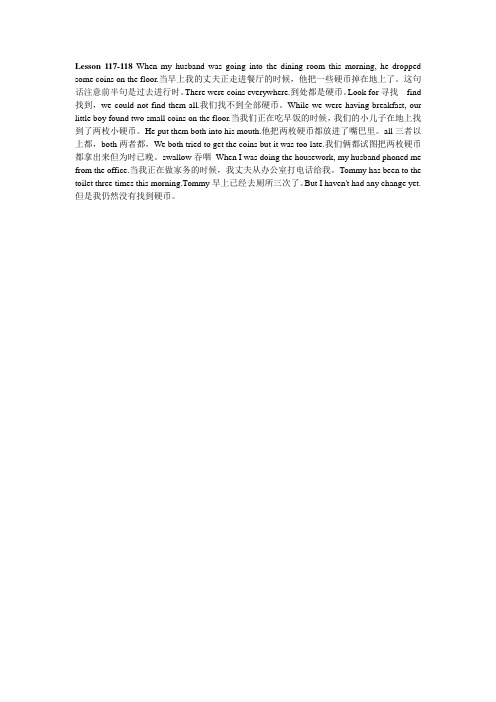
Lesson 117-118 When my husband was going into the dining room this morning, he dropped some coins on the floor.当早上我的丈夫正走进餐厅的时候,他把一些硬币掉在地上了。
这句话注意前半句是过去进行时。
There were coins everywhere.到处都是硬币。
Look for寻找---find 找到,we could not find them all.我们找不到全部硬币。
While we were having breakfast, our little boy found two small coins on the floor.当我们正在吃早饭的时候,我们的小儿子在地上找到了两枚小硬币。
He put them both into his mouth.他把两枚硬币都放进了嘴巴里。
all三者以上都,both两者都,We both tried to get the coins but it was too late.我们俩都试图把两枚硬币都拿出来但为时已晚。
swallow吞咽When I was doing the housework, my husband phoned me from the office.当我正在做家务的时候,我丈夫从办公室打电话给我。
Tommy has been to the toilet three times this morning.Tommy早上已经去厕所三次了。
But I haven't had any change yet.但是我仍然没有找到硬币。
新概念课堂笔记第一册Lesson117-118.pdf
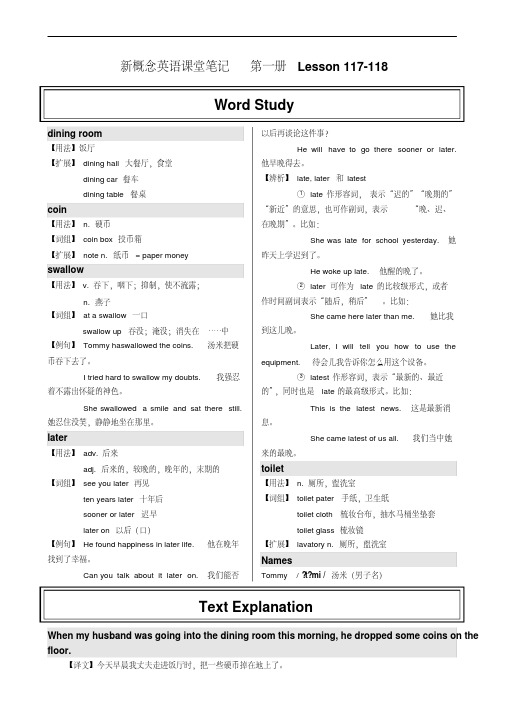
新概念英语课堂笔记第一册Lesson 117-118Word Studydining room【用法】饭厅【扩展】dining hall 大餐厅,食堂dining car 餐车dining table 餐桌coin【用法】n. 硬币【词组】coin box 投币箱【扩展】note n. 纸币= paper moneyswallow【用法】v. 吞下,咽下;抑制,使不流露;n. 燕子【词组】at a swallow 一口swallow up 吞没;淹没;消失在……中【例句】Tommy haswallowed the coins. 汤米把硬币吞下去了。
I tried hard to swallow my doubts. 我强忍着不露出怀疑的神色。
She swallowed a smile and sat there still. 她忍住没笑,静静地坐在那里。
later【用法】adv. 后来adj. 后来的,较晚的,晚年的,末期的【词组】see you later 再见ten years later 十年后sooner or later 迟早later on 以后(口)【例句】He found happiness in later life. 他在晚年找到了幸福。
Can you talk about it later on. 我们能否以后再谈论这件事?He will have to go there sooner or later. 他早晚得去。
【辨析】late, later 和latest○1late作形容词,表示“迟的”“晚期的”“新近”的意思,也可作副词,表示“晚、迟、在晚期”。
比如:She was late for school yesterday. 她昨天上学迟到了。
He woke up late. 他醒的晚了。
○2later可作为late的比较级形式,或者作时间副词表示“随后,稍后”。
比如:She came here later than me. 她比我到这儿晚。
新概念英语第1册_第117-118课
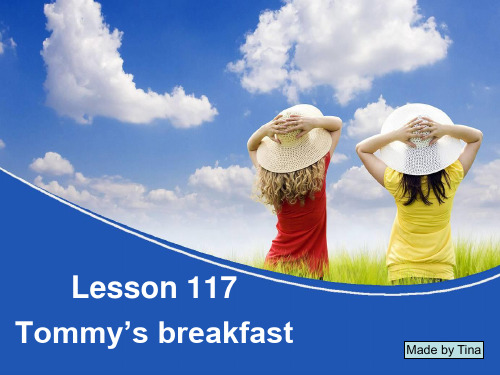
晚些时候 earlier 早些时候
Language points
8. Tommy’s been to the toilet three times this morning, but I haven’t had any change yet! • has been to 去过某地 • 与has gone to • 几次(time 次数,可数): • three times > twice > once • have had这里的had 原形是have=get=see弄到, 看到。 • yet 用于完成时的否定句中。
Grammar
1.构成 过去进行时 • was/were +现在分词 • 疑问句式 把 was/were 提前 • 否定句式 在 was/were 的后面加 not • 例:
Grammar
例:
Grammar
• 2. 如果过去的两个动作同时发生,我们可 以用when /while连接这两个同时发生的动 作。译作“正当…的时候”. • when 和 while用法区别:when既指时间 点,也可指一段时间; while只指一段时间, 因此when引导的时间状语从句中的动词可 以是终止性动词,也可以是延续性动词, 而while从句中的动词必须是延续性动词。
★dining room • dining table • sitting room / living room • bedroom • kitchen • balcony • garden 饭厅,餐室 餐桌 客厅 卧室 厨房 阳台 花园
Key words&expressions
★ coin n. 硬币 (note 纸币) toss a coin 掷硬币(打赌正面或反面) • P own coin. 以其人之道还治其人之身。
- 1、下载文档前请自行甄别文档内容的完整性,平台不提供额外的编辑、内容补充、找答案等附加服务。
- 2、"仅部分预览"的文档,不可在线预览部分如存在完整性等问题,可反馈申请退款(可完整预览的文档不适用该条件!)。
- 3、如文档侵犯您的权益,请联系客服反馈,我们会尽快为您处理(人工客服工作时间:9:00-18:30)。
新概念第一册117课笔记
1. when/while 当...的时候, 引导时间状语从句
2. was/were + doing 过去进行时: 表示在过去的某个时间或某段时间正在进行的动作
I was doing my homework at 7 last night.
They were cleaning the room yesterday morning.
3. dining room 饭厅、餐厅
dining hall 食堂
dining table 餐桌
dine vi. 吃饭
dine out 外出吃饭
4. drop 掉落(dropped, dropped)
drop sth. + 介词+ 地点
I dropped my keys on the floor.
5. go into + 地点进入到......
go into the room
6. There be + sth. + everywhere.= Sth. be everywhere.
There were books everywhere.=Books were everywhere.
7. look for... 寻找(强调过程)
find 找到,发现(强调结果)
I looked for my pen everywhere but I didn’t find it.
8. all 是them的同位语
对其前面的名词作进一步解释说明的成分叫做同位语
Mr. Smith, our new teacher, is very kind to us.
9. have breakfast/lunch/supper 吃早点/午餐/晚餐
注意:三餐前不能有冠词the
10. put sth. into... 把......放进......
put the books into the bag
11. both 两个都
(1) 放在主语后边,作同位语,表示“两者都......”
We both like English.
(2) both of + 人称代词(宾格)
Both of them 他们两个人=They both...
注意:both用于两者,all 用于三者或以上,结构同both,他们的位置通常放be动词后实义动词前12. try to do sth. 试图做某事;努力做某事
try doing sth. 尝试做某事
13. 过去完成时:had + done
过去完成时表示过去某一时间或动作以前已经发
生或完成了的动作。
它表示动作发生的时间是“过去的过去”。
I had finished my homework before 5 yesterday.
14. later ①adv. 后来,稍后②adj. 较晚的
I will see you later.
He came later than usual.
sooner or later 早晚,总有一天
15. do the housework 做家务
16. phone/telephone/ring/call + sb. 给某人打电话
17. from the office 从办公室
18. have been to/have gone to 区别
19. time ①时间②次数
过去进行时用法(was/were+ doing)
1. 表示在过去的某个时间点,动作正在进行
I was watching TV at 8 o’clock yesterday.
2. 表示在过去的一段时间内,动作一直在进行
I was watching TV the whole morning.
过去进行时在时间状语从句中的应用:
过去进行时在时间状语从句中的应用:
当一个动作正在进行的过程中,另外一个动作发生了。
when...was/were doing, ...did...
当一个动作发生的时候,另外一个动作正在发生。
when...did..., ...was/were d oing…
while 也翻译成“ 当……的时候” ,但是while后面的动词只能用持续性的动词而且必须是过去进行时When...was/were doing, ...did...
When/while my mother was cooking, my father came in.
When my father came in, my mother was cooking.。
